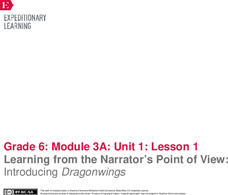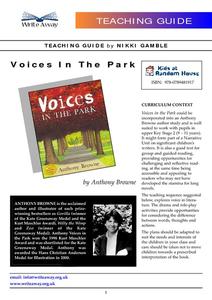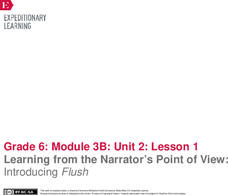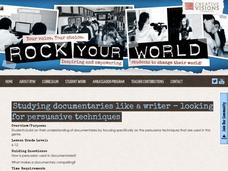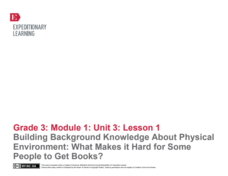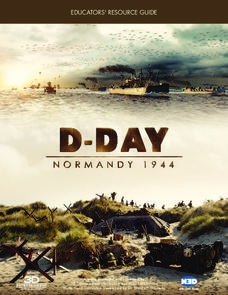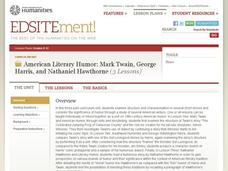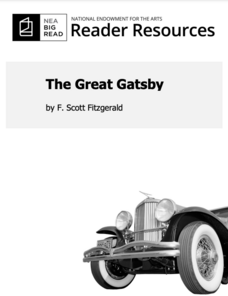Manchester College
What’s Your Point of View?
Work on deciphering the point of view of various pieces of literature. As readers review the concepts of first, second, and third person perspective, they apply what they know to different passages.
EngageNY
Analyzing Point of View: Inferring about the Natural Disaster in Eight Days
Who is telling the story? Readers take a look at the text Eight Days to determine if the story is told in first or third person. They then discuss in groups and complete a shared writing activity to describe how the narrator's point of...
EngageNY
Learning from the Narrator’s Point of View: Introducing Dragonwings
Journey into the past with Laurence Yep's Dragonwings. Scholars complete anchor charts to analyze techniques the author uses to develop the narrator's point of view in his novel. As they read, pupils also complete word catchers to...
National Endowment for the Humanities
Edgar Allan Poe, Ambrose Bierce, and the Unreliable Narrator
Stories by Edgar Allan Poe and Ambrose Bierce provide readers with an opportunity to investigate unreliable narrators. The lesson plan begins with an activity about different types of point of view and continues as scholars apply their...
Write Away!
Voices In the Park
Explore the impact a narrator's point of view has on a story with a reading of the children's book, Voices in the Park by Anthony Browne. Written in four different voices, the story is told and retold from different perspectives to...
EngageNY
Learning from the Narrator’s Point of View: Introducing Flush
It is all down the drain. Scholars read chapter one of Flush and write any unfamiliar words in their word catchers and identify the narrator and point of view of the story. Pupils complete a point of view anchor chart and use Thought,...
Syracuse City School District
Literary Elements
Address the literary elements in a piece of writing using these materials. The packet includes plenty of resources, and focuses mainly on theme, character, and point of view, with some materials for setting, symbolism, and author's...
Simon & Schuster
Curriculum Guide to: Wuthering Heights by Emily Brontë
Eight lessons and worksheets comprise a curriculum guide for Emily Bronte's Wuthering Heights. Class members create a timeline that includes world-historical events as well as events in the novel. They analyze the speaking styles of...
EngageNY
Grade 12 ELA Module 1: Unit 1, Lesson 6
To prepare for drafting their Common Application narrative, class members return to the opening pages of The Autobiography of Malcolm X and examine how Haley engages and orients readers, establishes his narrator and point of view, and...
National Endowment for the Humanities
Narrative Voice in Moby Dick
Call him a reliable narrator! Ishmael is the focus of a instructional activity that asks readers to analyze the complex character of Herman Melville's narrator as he is introduced in the first chapter of Moby Dick.
Creative Visions Foundation
Studying Documentaries Like a Writer - Looking For Persuasive Techniques
Revisit the documentaries viewed in the previous lesson in this series in order to take a look at the persuasive techniques employed by the documentary creators. Small groups watch the films a second time, taking notes on two provided...
EngageNY
Building Background Knowledge About Physical Environment: What Makes it Hard for Some People to Get Books?
How far would your pupils go to be able to have access to books? Revisit Heather Henson and David Small's That Book Woman and challenge class members to take on the role of Cal or the Book Woman. By putting themselves in someone else's...
D-Day Normandy 1944
D-Day Normandy 1944
No study of World War II would be complete without an in-depth examination of the events of June 6, 1944. Pascal Vuong's D-Day Normandy:1944, is the perfect vehicle to convey the sheer magnitude of the events that have been called...
Penguin Books
A Teacher's Guide to the Signet Classic Edition of Edith Wharton's Ethan Frome
Is it possible to have too much concern for others? Can we be trapped by our expectations as well as those of society? Edith Wharton's chilling tale of Ethan Frome asks these and other disquieting questions. Signet's guide to Ethan Frome...
Curated OER
Rural Life During the Great Depression: A Year Down Yonder
“Anyone who thinks small towns are friendlier than big cities lives in a big city.” Mary Alice, the fifteen-year-old narrator of A Year Down Yonder, is forced to leave Chicago and spend a year with her Grandma Dowdel in a small rural...
Curated OER
Express Yourself Lesson Seed 9: Climax
Conduct a close reading of chapter 9 of The Cay. Read the chapter again and ask pupils to respond to a list of included text-dependent questions. Finish the class with the provided writing assignment, which asks learners to use textual...
Dr. Seuss Enterprises
Dr. Seuss in the Classroom
Explore the works of Dr. Seuss, such as Horton Hears a Who, Horton Hatches and Egg, The Sneetches and Other Stories, The Lorax, The Butter Battle Book, and Yertle the Turtle and Other Stories. Each story lesson includes reading...
National Endowment for the Humanities
American Literary Humor: Mark Twain, George Harris, and Nathaniel Hawthorne
Nathaniel Hawthorne as a humorist? Really? The three lessons in this series focus on the the storytelling style, conventions, and literary techniques employed by Hawthorne, George Washington Harris, and Mark Twain.
National Endowment for the Arts
Reader Resources: The Great Gatsby by F. Scott Fitzgerald
A handy guide offers high schoolers support as they read the American novel, The Great Gatsby. Complete with a biography of F. Scott Fitzgerald, a timeline of the Roaring Twenties, discussion questions about the novel, and more, this...
Gwinnett County Public Schools
Analysis of the Tuck Everlasting and The Birchbark House Text Exemplars
Looking to introduce some text-based questions into your ELA lessons? Practice the kinds of skills the Common Core demands with the seven text-based questions and the essay prompt provided here. Designed to be a three-day lesson, day one...
EngageNY
Gathering Evidence and Drafting a Two-Voice Poem (Chapter 13: "Los Duraznos/Peaches")
Begin class with a short comprehension quiz and review and then move into a new genre: two-voice poems. The activity provides information about this type of poetry as well as a video example made by eighth graders that you can show your...
Curated OER
Constructing Narrative from the Migrant Experience in Literature
Excerpts from John Steinbeck's The Grapes of Wrath and from John Fante's Ask the Dust, as well as a variety of primary source documents provide the background for an examination of the migrant experience from 1920-1945.
Prestwick House
Catcher in the Rye Activity Pack
The Catcher in the Rye is the focus of a sampler that models some of activities included in a for-purchase packet based on J. D. Salinger's novel.
Curated OER
Understanding Tiananmen Square
William Bell's Forbidden City is used as the basis of a study of China, Chinese culture and government, and especially of the events in Tiananmen Square in 1989. Class members select a topic for Internet research and then prepare a...


